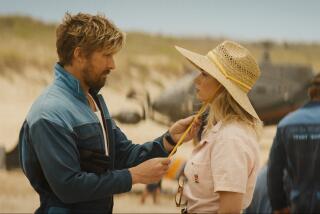SXSW 2013: A woman at the helm of Neil LaBute’s ‘Some Girl(s)’ film
Just the name Neil LaBute can be a litmus test — garnering knowing smiles, dismissive eye rolls or even cursing. The filmmaker and playwright, who frequently shines a light into the darker corners of the male psyche, certainly gets a response out of audiences and critics; his work on stage and screen has been called misogynistic and even misanthropic.
LaBute burst onto the film scene in 1997 by adapting his own “In the Company of Men,” and in 2003 he adapted his play “The Shape of Things” with the stage cast including Paul Rudd and Rachel Weisz. He has become a journeyman filmmaker, with recent movies including unlikely remakes of Robin Hardy’s 1973 “The Wicker Man” and Frank Oz’s 2007 “Death at a Funeral.”
“I do know it’s gotten to a place where people seem polarized in either ‘I like what he’s doing’ or ‘I don’t really care for him,’” LaBute said by phone from New York. “I think it’s great to get a reaction, that’s what many of us want to do as storytellers, and I don’t mean just to poke somebody in the eye and they go ‘Ow,’ because of course that’s going to happen.”
PHOTOS: SXSW 2013: 13 must-see films
No one but LaBute has brought his own plays to the screen before, but that will change Saturday night with the world premiere of the film version of his 2006 work “Some Girl(s)” as part of the South by Southwest Film Festival in Austin, Texas. LaBute wrote the screenplay, but the film is directed by Daisy von Scherler Mayer, perhaps best known for her 1995 Parker Posey film “Party Girl.” Recently, she’s been directing television shows including “Mad Men” and “Shameless,” and “Some Girl(s)” marks her first feature film since 2002’s cross-cultural sex comedy “The Guru.”
“Some Girl(s)” follows a man (Adam Brody) who travels to Seattle (twice), Boston, Chicago and Los Angeles for meet-ups with a series of ex-girlfriends, played by Jennifer Morrison, Mia Maestro, Emily Watson, Zoe Kazan and Kristen Bell.
Using his recent engagement and impending marriage as a premise for the visits, he seems not to be looking to apologize, right past wrongs or enjoy a few final flings. Rather, it’s as if he’s flipping through a live lookbook of his former flames, perhaps to remind himself of the sway he once held over these women. For each of them, it’s not clear what he wants out of the exercise.
Bringing a woman’s directorial eye to “Some Girl(s)” may have deepened its dynamic, much as it took director Mary Harron to bring the unstable psychosis of “American Psycho” to the screen. (Though LaBute has collaborated on his stage productions with women such as director Jo Bonney, who worked on the debut of “Some Girl(s).”)
“I find it really frustrating how a lot of people are really closed off talking about Neil LaBute,” said Patty West, a producer on the new film. “Especially women, saying he’s misogynist, saying he’s sexist. And I think we’re able to have a different conversation about the work now simply because of the gender of our director, which is great.”
“He portrays sexism and manipulation and all these things, but does that mean he is those things?” said Von Scherler Mayer. “How could I relate to it so well if he didn’t understand me, as a woman?”
PHOTOS: Iconic rock guitars and their owners
The film was pulled together by producers Andrew Carlberg, Chris Schwartz and West, working initially with director Jennifer Getzinger, who had to drop out after only a day of filming due to a fatal accident in her family. The two directors are friends, so when Von Scherler Mayer first received a call after 11 p.m. one night, she was on-set first thing the next morning. The structure of the production made the sudden change a bit less problematic than it might have been, as each sequence was created with one day of rehearsal and three days of shooting.
The structure of the story gives each actress her own moment while creating a larger emotional momentum and through line for Brody’s character. As he moves from woman to woman, he seems to spiral deeper into his own pathology, with the actor’s intelligence and likability giving the character a quicksilver malleability.
“That’s the real trick for me, here’s someone where you may say, ‘Oh, I don’t want to date that guy,’ but I’m not asking you to date that guy,” said LaBute, “I’m asking you to watch that guy and hopefully his shenanigans are interesting enough you want to watch the journey that he makes.”
Said Von Scherler Mayer: “To me it’s not a totally typical Neil LaBute character. He’s a wolf in sheep’s clothing. He’s sensitive and he’s smart and he’s really caring and he’s really present and emotionally available for the relationship but I think he’s sadistic. There is so much dishonesty within the sensitivity.”
For Brody, his part in “Some Girl(s)” is in some sense a continuation of his other recent role in the Whit Stillman comedy “Damsels in Distress,” where his character was more than once referred to as a “playboy or operator type.” This time, the label is taken to a dark extreme.
Of realizing LaBute’s characterization, Brody said: “He highlights that part of you that is pettiest and most superficial and the most regrettable.”
PHOTOS: SXSW 2013: 13 must-see films
LaBute, meanwhile, isn’t getting out of the film game: “Some Velvet Morning,” a movie he wrote and directed starring Stanley Tucci and Alice Eve, will have its world premiere at the Tribeca Film Festival in April.
His stage adaptation of August Strindberg’s “Miss Julie” will be staged this spring in Los Angeles, while in New York he will direct the stage debut of “Reasons to Be Happy,” the follow-up to his play “Reasons to Be Pretty.”
With “Some Girl(s)” LaBute, Von Scherler Mayer and Brody have created a male character who is engaging, enigmatic, at times sympathetically confused and in the end rather despicable. With its prismatic view on male-female relationships, responses to the film will likely say as much about the individual viewer as about whatever happens on-screen.
As to whether the character actually learns anything from his travails or simply confirms his own narcissistic self-regard, LaBute says that’s likely best left to somebody else.
“Ultimately I don’t even have to think about it,” said LaBute. “I would have an opinion and somebody else would say, “I don’t care that you wrote it, I see a guy who is never going to change” and we could both be right. The conclusion is there for you to make.”
PHOTOS AND MORE
TIMELINE: Violence in movies
ENVELOPE: The latest awards buzz
PHOTOS: Greatest box office flops
More to Read
From the Oscars to the Emmys.
Get the Envelope newsletter for exclusive awards season coverage, behind-the-scenes stories from the Envelope podcast and columnist Glenn Whipp’s must-read analysis.
You may occasionally receive promotional content from the Los Angeles Times.







